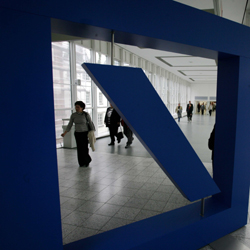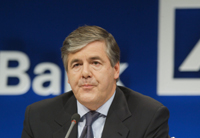ACTIONS CORNER
 Because of the failure of MF Global two pension funds have sued, among others, the Deutsche Bank. The funds accuse six banks of having concealed in prospectuses problems which eventually led to the broker’s collapse. The complaints were received on 18 November. MF Global had speculated with risky bets on European government bonds, and sought bankruptcy protection in late October. Because of the presumed recourse to customer accounts – apparently up to $1.2 billion is missing, twice as much as was initially reported – the regulatory authorities and the FBI are looking into the case.
Because of the failure of MF Global two pension funds have sued, among others, the Deutsche Bank. The funds accuse six banks of having concealed in prospectuses problems which eventually led to the broker’s collapse. The complaints were received on 18 November. MF Global had speculated with risky bets on European government bonds, and sought bankruptcy protection in late October. Because of the presumed recourse to customer accounts – apparently up to $1.2 billion is missing, twice as much as was initially reported – the regulatory authorities and the FBI are looking into the case.
The Deutsche Bank has been able to avert a dispute about the sale of mortgage-backed securities to five U.S. credit unions by paying 145 million dollars. The German industry leader did not have to admit guilt for the settlement. The bank was satisfied that it had solved the issue without having had to go to court, a spokesman said on 14 November in New York. The National Credit Union Administration had accused the financial institution of having given incorrect or incomplete information in connection with the sale of so-called mortgage-backed securities.
 On 14 November it was revealed that Munich public prosecutors are investigating Josef Ackermann. They accuse the 63-year-old Swiss and former board colleagues Rolf Breuer, Clemens Börsig and Tessen von Heydebreck of attempted deceit of court and unsworn false testimony in the litigation with Leo Kirch. A raid was made on Ackermann’s executive office in the Deutsche Bank in the first week of November, according to a spokeswoman for the authorities. The villa of his predecessor Breuer in Frankfurt and his holiday apartment in Kitzbühel were also searched. The Deutsche Bank has now described Kirch’s lawyers’ access to the files as inappropriate, and suspects illicit collusion between individual judges and prosecutors that could have led to the raid in Frankfurt. After rejection of Breuer’s lawyers’ challenge on grounds of bias, the indictment was read on 24 November. Proceedings are to continue on 2 December.
On 14 November it was revealed that Munich public prosecutors are investigating Josef Ackermann. They accuse the 63-year-old Swiss and former board colleagues Rolf Breuer, Clemens Börsig and Tessen von Heydebreck of attempted deceit of court and unsworn false testimony in the litigation with Leo Kirch. A raid was made on Ackermann’s executive office in the Deutsche Bank in the first week of November, according to a spokeswoman for the authorities. The villa of his predecessor Breuer in Frankfurt and his holiday apartment in Kitzbühel were also searched. The Deutsche Bank has now described Kirch’s lawyers’ access to the files as inappropriate, and suspects illicit collusion between individual judges and prosecutors that could have led to the raid in Frankfurt. After rejection of Breuer’s lawyers’ challenge on grounds of bias, the indictment was read on 24 November. Proceedings are to continue on 2 December.
In the dispute over speculative interest bets, the Deutsche Bank is to pay €945,000 compensation to four Baden-Württemberg utilities. This out-of-court settlement had been determined by the Federal Court of Justice, said the plaintiffs’ attorneys. Thus the Oberlandesgericht Stuttgart verdict of a year ago in this swap case is now final. It is the first delivered in full favour of the plaintiffs. For years, the bank has been fighting with local authorities and businesses over so-called CMS spread collector swaps and CMS spread ladder swaps (CMS: Constant Maturity Swap), with which customers had suffered heavy losses, sometimes in the millions. In CMSs the interest payments of a swap partner are adjusted at regular intervals to a reference interest rate.
 Deutsche Telekom has terminated its contracts with Drillisch without notice and levelled criminal charges on suspicion of commission fraud at a subsidiary (Simply) of its long-term business partner. The mobile-service provider dismissed the allegations of the Bonn group, according to a release, “decidedly”. In particular, Telekom’s allegation that Drillisch had activated tens of thousands of wireless connections without appropriate underlying customer relations did not correspond with the facts.
Deutsche Telekom has terminated its contracts with Drillisch without notice and levelled criminal charges on suspicion of commission fraud at a subsidiary (Simply) of its long-term business partner. The mobile-service provider dismissed the allegations of the Bonn group, according to a release, “decidedly”. In particular, Telekom’s allegation that Drillisch had activated tens of thousands of wireless connections without appropriate underlying customer relations did not correspond with the facts.
E.on is the first German energy company to complain to the Federal Constitutional Court against the nuclear phase-out. The 276-page constitutional complaint against the Federal Republic of Germany was filed in Karlsruhe, said a company spokesman. Without compensation, E.on thinks, the phase-out act is unconstitutional for the companies concerned. A spokesman for the utility said that it was intervention in the property right protected by the Basic Law and meant a financial loss in the high single-digit billions. The German government decided the phase-out by 2022 after the Fukushima nuclear disaster at the end of June.
 Suzuki has as announced filed a case against Volkswagen at the Court of Arbitration of the International Chamber of Commerce in London. The Wolfsburgers are to be forced to dispose of the shares held in Japan’s fourth-largest carmaker to Suzuki or a third party. Volkswagen wants to keep the 19.9 percent share, however. Suzuki currently holds 1.5 percent of the German carmaker. The International Court of Arbitration is now to decide, after the cooperation agreed in December between the deeply divided partners failed. VW again rejected all accusations of noncooperation.
Suzuki has as announced filed a case against Volkswagen at the Court of Arbitration of the International Chamber of Commerce in London. The Wolfsburgers are to be forced to dispose of the shares held in Japan’s fourth-largest carmaker to Suzuki or a third party. Volkswagen wants to keep the 19.9 percent share, however. Suzuki currently holds 1.5 percent of the German carmaker. The International Court of Arbitration is now to decide, after the cooperation agreed in December between the deeply divided partners failed. VW again rejected all accusations of noncooperation.
The EU Commission has, as expected, decided to re-open an infringement procedure against Germany before the European Court of Justice because of the VW law. In the Commission’s view, the German authorities had implemented the court decision of 2007 only inadequately, and it urged the court to impose a fine. At Volkswagen , the 20-percent blocking minority guaranteeing the State of Lower Saxony veto power at general meetings is controversial. This practice is contrary to the spirit of the European internal market, said EU Internal Market Commissioner Michel Barnier.















